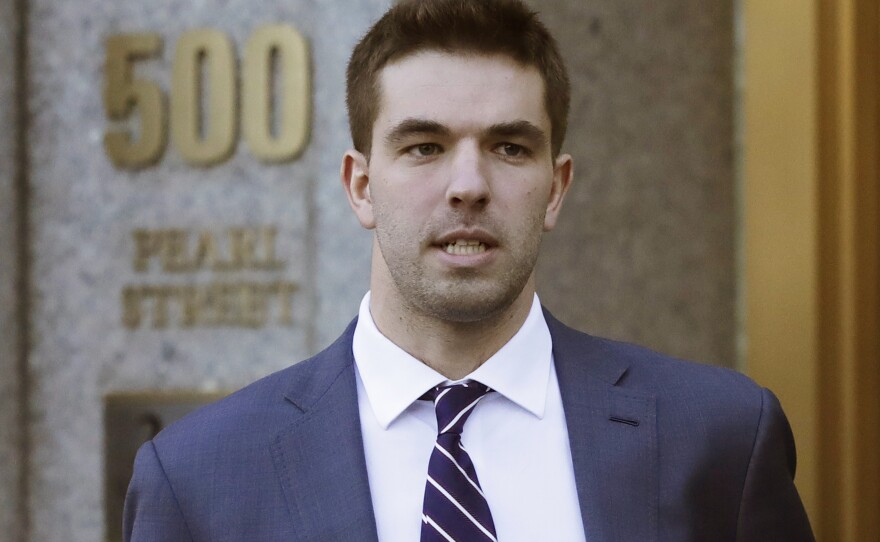The spectacular failure of the Fyre Festival in 2017 revealed widespread fraud by creator Billy McFarland, who ended up in a federal prison for four years after bilking investors and ticket buyers out of more than $26 million.
Now, McFarland — who was released back into the world in March 2022 and still owes that money in restitution — is resurrecting his dream of putting on a bigger and better Caribbean Coachella with the unveiling of Fyre Festival II.
On Sunday, standing on a rooftop while dressed in a white bathrobe, he took to YouTube to announce that tickets for the extravaganza, slated sometime in December 2024, were officially up for grabs at $499 a pop.
The event, he claimed, is in response to "interest and demand" in his ability "to bring people from around the world together to make the impossible happen."
"Guys, this is your chance to get in. This is everything I've been working toward so let's f****** go," he told viewers.
By Tuesday, the festival's website stated that tickets — all 100 of them — were sold out.
The déjà vu-ness of it all got NPR wondering, is it even legal for McFarland to launch such an endeavor?
Understanding the conditions of McFarland's release from prison
The short answer is, yes.
"Nowhere in the conditions of [McFarland's] release does it say he can't do this," Larry Levine told NPR, reading from McFarland's court documents.
Levine, a former convict himself, is the director and founder of Wall Street Prison Consultants, a company that offers consulting packages for white-collar criminals heading to prison. His services include lessons on polygraph manipulation techniques, prison survival orientation coaching and guidance on how to reduce the length of a sentence.
He noted that while some people convicted of white-collar crimes are explicitly prohibited from engaging in the same types of activities that led them to prison in the first place, no such limitations were established for McFarland.
The terms of the agreement do stipulate that McFarland remain under supervisor release for three years, placing him under the jurisdiction of the U.S. probation office. He is required to check in with a probation officer regularly. Also under the deal, McFarland is required to work at least 30 hours per week "at a lawful type of employment, unless the probation officer excuses you from doing so."
"That means that the probation office most likely had to give him permission to do this. ... He had to get permission from somebody," Levine said, adding that that was the case in his own experience.
Given McFarland's high profile, the very public announcement of the new venture and the subsequent news it has generated over the last few days, Levine posited that if McFarland somehow failed to get permission from his probation officer, "he'd be sitting in the Metropolitan Detention Center right now."
If McFarland were his client, he said, "I would have somebody else — a real accounting firm — take the money and worry about the festival and not have my hands in it. That way, if something happens, you can point the finger and say, 'Well, they did it.' "
One more hurdle for McFarland will be actually attending the festival next year. The conditions of his release include travel restrictions limited to southern New York. If he wants to attend his own party, he's got to get authorization from the court.
This may not prove so difficult. Legal filings show the McFarland was allowed to travel to Germany in April to be a speaker at The Founder Summit 2023, which is billed as a conference/party featuring "the best speakers, entrepreneurs and successful personalities from all over the world."
Where will the profits go?
The presale tickets listed on the Fyre Festival II website would add up to nearly $1.2 million if they all sell. Festival passes start at $499 and are set to eventually reach $7,999. Plus, he is offering $200 hoodies and other merchandise, including hats and sweatpants.
But that doesn't mean he'll get to keep all that cash for himself; McFarland may be free of his prison sentence but he is not free of his debt to the people he fleeced. The court ordered the controversial entrepreneur to make financial amends to the investors and ticket vendors who were duped by McFarland's fantastical promises of yore.
That means McFarland is forced to fork over a portion of any money he makes — including the speaker's fee he earned on his trip to Germany — although exactly how much remains unclear.
McFarland's lawyer, Jason Russo, has previously said that his client is committed to repaying the roughly $26 million he owes for his crime.
"Any new projects that he does become involved in will be done solely for the purpose of generating the restitution for paying back his victims," Russo said.
In a post on X, the platform formerly known as Twitter, McFarland explained that all presale ticket revenue for the upcoming festival "will be held in escrow until the final date is announced."
Jennifer Taub, author of the book The Big Dirty about white-collar crime and a professor of law at Western New England University School of Law, told NPR she teaches a section of her class on McFarland.
"It's really hard to understand what's going on here," Taub said after watching the YouTube video in which McFarland claims that he has signed a deal with a production company to put up a Broadway musical version of the Fyre Fest saga. He also discloses that he has partnered with "the biggest and best TV companies in the world to produce a documentary called 'After the Fyre.' "
"He's trying to make it look like you buy the tickets, and it'll be a great event," but it's unlikely he will have the funds to pay A-lister stars to perform at the festival based on the ticket sales, Taub said. "Where is that money supposed to come from?"
She added: "This is looking a lot like a Ponzi scheme."
Like Levine, Taub speculated that prosecutors are keeping a close eye on McFarland's new money-making scheme.
She listed a slew of concerns they might have: "You'd want to see where the money is going. Is he putting this into bank accounts? Is he paying people back with it? Is he paying for his new shoes? Is he drawing a salary from it?"
Another thing prosecutors are likely watching is the nature of the language of McFarland's advertising, and so far, Taub said, he's doing a good job of avoiding potential accusations of fraud.
"When I look at [the website], he's really not saying much. He's not promising much. He's just saying he's planning something so buy tickets," she said.
Indeed, there is little specific information on the site. The only real details are the cost of tickets and a date — Dec. 6, 2024. But an asterisk next to it clarifies even that is not set in stone.
McFarland manages to elude any description of what Fyre Festival II will entail or where in the Caribbean it will actually take place. There is no mention of music or specific artists. The only concrete detail is found under the description of what a Fyre pass gets a buyer: "1 ticket to FYRE Festival II, as well as immediate VIP access to FYRE Events, Experiences, and Community."
"So far, you can't say there's anything misleading with any of that," Taub said, "and that's smart."
Copyright 2023 NPR. To see more, visit https://www.npr.org. 9(MDAzMjM2NDYzMDEyMzc1Njk5NjAxNzY3OQ001))







